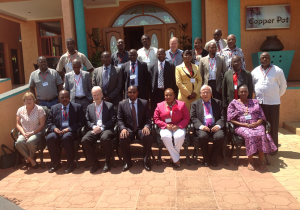
SADC REGIONAL WORKSHOP ON CLIMATE CHANGE ADAPTATION RESEARCH IN AGRICULTURE, CROSS ROADS HOTEL, LILONGWE: In attendance
Dr Arne Tostensen Co-Leader of CAAST-Net Plus Work Package Two on Climate Change, NCST Director General Anthony Muyepa, SADC Programme Officer for Environment Sibongile Mavimbela, Co-Leader of the CAAST-Net Plus Work Package Mike Hughes, Chairman of the Workshop Organising Mr Mike Kachedwa.
As a member of CAAST-Net Plus Consortium and a Beneficiary partner to the Work Package Two in this prestigious CAAST-Net Plus European Union-Sub-Saharan Africa Project that is focussing on three global challenges, one of which being climate change, the National Commission for Science and Technology is glad to host this important workshop.
The participation in this consortium and consequently hosting this workshop by the Commission is in tandem with the Commission’s legal mandate which is “to promote, support, co-ordinate and regulate the development and application of research, science and technology”.
The objectives of the workshop are;
a) to take stock of research in progress on climate change adaptation in Agriculture within the SADC Region;
b) to identify research gaps in climate change adaptation in Agriculture within the SADC region with a view to stimulate bi-regional research initiatives to fill the gaps; and
c) to promote bi-regional research initiatives in climate change adaptation related to Agriculture
These workshop objectives, are within the sphere of recognition and emphasis of the Government of Malawi and the National Governments of SADC countries in as far as the adverse effects of climate change in agriculture are concerned. Climate change is one of the biggest global challenges of the 21st Century and is mainly caused by emission of greenhouse gases (GHGs) such as carbon dioxide into the atmosphere. Some of the effects of climate change globally include droughts and floods, sea level rise, melting of polar ice caps and increased incidences of diseases and parasites. These incidences have caused serious physical and social stress on many lives particularly in developing countries such as those in the SADC region because of their overdependence on agriculture. Consequently, issues of food security and general rural livelihoods are significantly challenged in these countries due to the climate change effects. For example, Malawi’s unique and fragile ecosystems are particularly vulnerable to the effects of climate change. This vulnerability is exacerbated by a number of factors that include socio-economic and demographic factors; slim economic base; limited agro-processing facilities; and dependence on rain-fed agriculture and biomass energy. This vulnerability is also associated with low adaptive and technical capacity at the community and national levels. Malawi’s vulnerability to climate change effects is true for other countries within the SADC region.
In spite of various efforts by national governments to address climate change issues, most SADC countries are not adequately equipped, in terms of capacity, to address adaptation, mitigation and effects or challenges brought about by climate change. I am sure, therefore, that the presentations that will be made at this workshop will provide valuable information on the on-going initiatives, practices and experiences in climate change adaptation related to Agriculture in the SADC countries here present. Thus, participation in the CAAST-Net Plus offers a new hope to the participating countries and institutions as the CAAST-Net Plus aims at promoting research collaboration between Europe and sub-Saharan Africa on topics of mutual interest.
Work Package Two in CAAST-Net Plus is specifically oriented towards promoting joint research related to climate change as a global societal challenge. I am particularly aware that one of the tasks of Work Package Two is to organize stakeholder consultations such as a workshop of this nature to inform participants and build the concept of a platform for supporting bi-regional research and development innovation around joint climate change priorities.
This workshop gives participants an opportunity to talk more on these research initiatives and on building the concept of a platform for supporting bi-regional research and development innovation around climate change priorities. The programme includes plenary sessions.
Climate Change Adaptation Research in Agriculture has un doubtedly great potential to help nations world over to speedily attain food security and create wealth for nations. Research in Climate Change Adaptation can play a big role towards transforming nations from being predominantly importing and consuming economies to becoming predominantly producing and exporting economies. Therefore, the National Commission for Science and Technology is particularly pleased to be associated with the organisation of this Workshop that provides an opportunity for free and open dialogue on research in Climate Change Adaptation in Agriculture.